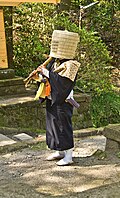Kinko Kurosawa
| Part of a series on |
| Komusō |
|---|
 |
| People |
|
| Philosophy |
|
| Places |
|
| Topics |
|
| Literature |
|
|
Kinko Kurosawa (黒沢 琴古, Kurosawa Kinko) was an 18th-century komusō of the Fuke sect of Zen Buddhism. A former samurai, he became a shakuhachi instructor and founded the Kinko-Ryu (ja) school of shakuhachi.[1]
Commissioned to travel around Japan to research and collect spiritual shakuhachi music pieces (honkyoku) from his fellow mendicant monks, Kurosawa is credited with helping shakuhachi music transition from a solely spiritual tool into music appreciated by a secular audience through his selection of 36 honkyoku chosen to form the shakuhachi repertoire of the Kinko-Ryu school to be played by its priests.[2]
Legacy
The Kurosawa crater on the planet Mercury is named for Kinko Kurosawa.[3]
Shika No Tone (Distant Calls of Deer), a honkyoku arranged by Kurosawa, is featured on the Memoirs of a Geisha soundtrack.[4]
References
 | This article about a member of the Buddhist clergy is a stub. You can help Wikipedia by expanding it. |
- v
- t
- e
 | This Zen biography-related article is a stub. You can help Wikipedia by expanding it. |
- v
- t
- e
 | This biography of a Japanese religious figure is a stub. You can help Wikipedia by expanding it. |
- v
- t
- e











